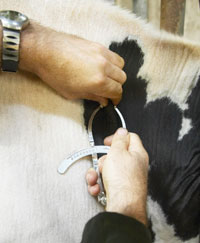Why use mushrooms to tackle TB? All the questions answered

What is the background to using mushrooms to treat bTB and what are the challenges faced? Aly Balsom speaks to RPF Bioscience’s Richard Edwards to find out more.
Why did you make the decision to pursue the effect of mushrooms on TB?
During the past 12 years we have come across many references to various forms of TB being treated with mushrooms and in some cases the word “cure” had been used.
We have gathered information and data for some time and last year, during a discussion with a colleague in Hawaii, we were given what we thought was the final piece of the jigsaw which we had built up over these years.
After this discussion I can say I am 95% sure this treatment will work.
Are you primarily involved in human treatment – what is your link with farming?
For the past 12 years we have been supplying our extracts to private cancer clinics all over the world – we export to 27 countries.
We have applied these products to animals (mainly dogs and horses) and we have had good results, particularly with shrinking tumours, which also happens with humans. We are also arable and livestock farmers – the family farms in Ireland, Cheshire and Shropshire.
Do you think getting the mushroom formula to be effective in cattle will be a challenge?
No I don’t – the problem we have is we don’t want to burden farmers with extra costs: some already deliver all-trace boluses to cattle each year, which is an expense, and when they have to deliver our treatment as well then there is obviously extra cost.
At this stage we are considering adding the minerals and vitamins to our bolus.
What initial studies have been carried out into the effect of mushrooms on bTB?
We also have evidence mushrooms have “cured” TB in humans.
We have also carried out experiments that have proven the vegetative part of the fungus of many species which we intend to use in our treatment will actually consume bTB.
However, what happens on an agar plate under lab conditions does not prove the same actions will take place within the animal.
We have agreed phase one testing parameters with the VLA and then phase two testing will have to be in-field, and we need to discuss these with the Welsh Assembly Government and possibly DEFRA and the farming unions once phase one testing has been completed by 9 August this year.
We will not have complete evidence until we gather data from field trials – 2011
You mention anecdotal and published evidence – what is this? Do you have any facts and figures as to how effective mushrooms have been at treating TB?
Yes we do, but I cannot provide references as this is the crux of our hypothesis, which is the crux of the business.
We have no evidence of how the mushrooms work with cattle, other than discussions with world experts, which would indicate our hypothesis is worth testing.
Is the mushroom compound concerned with boosting the immune system and preventing a cow from contracting TB or does it have a part to play in treating an already infected animal?
We think the treatment would cure bTB, but I don’t think the Government will allow animals to be treated on farms.
The response to bTB is slaughter, which it is apparently effective according to the Government. We will focus on the immune system and the general well-being of the animal.
You mention TB has been cured in human using rare and obscure mushroom species grown wild in Europe – what species are these, does their rarity make them difficult to get hold of and more expensive? Does this mean the resulting product will be expensive?
I cannot disclose which species we are planning to use just yet as we have to test them. All species are native to the UK, and I believe, we are one of only two companies in the world who grow one of the species commercially.
They are rare in the wild, but we have learned how to cultivate them on hardwood, which we have on-farm. We are hoping the treatment will be about the same price as an all-trace bolus treatment – about £10 an animal a year.
When do you envisage that your anti-TB product Myco Formula 5 will be available?
If all goes well, I would hope that we will have the treatment ready by the autumn of this year, however we will not be able to make any product claims relating to the treatment of bTB until testing has been carried out and data gathered.
